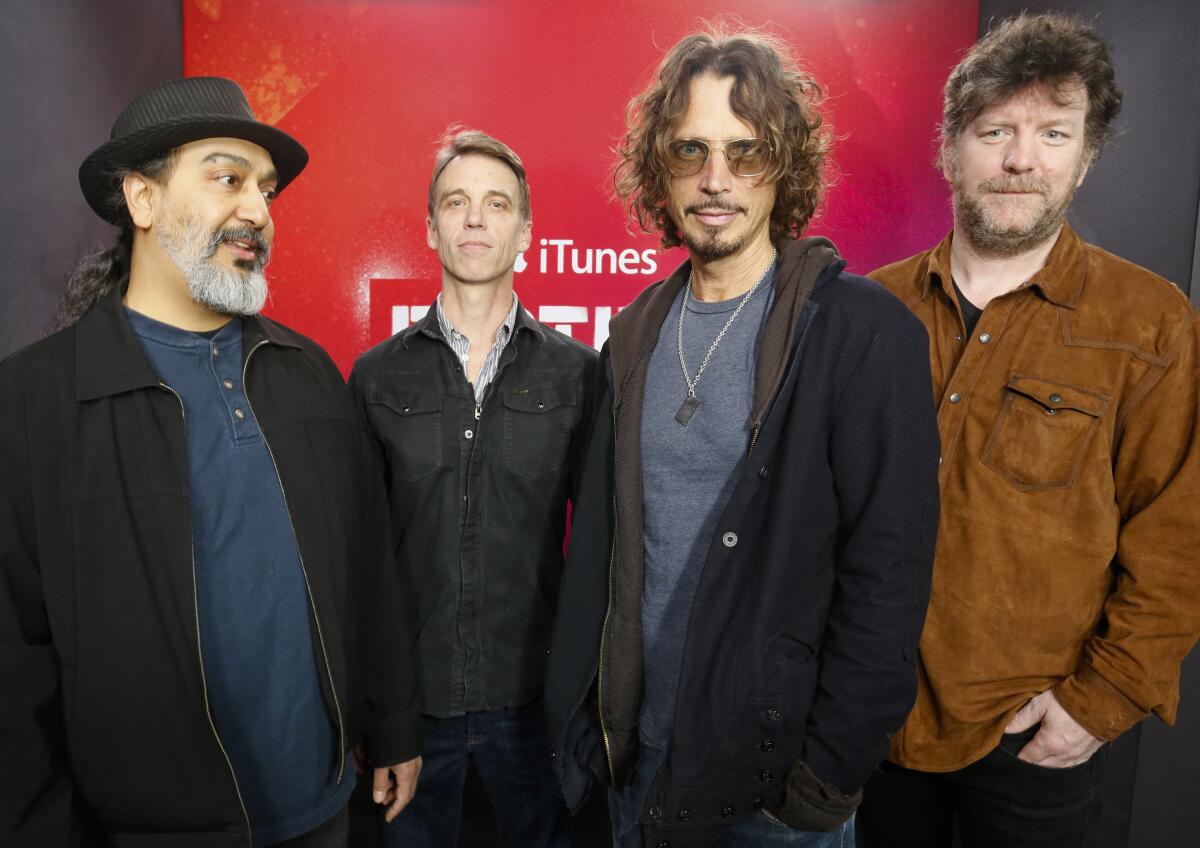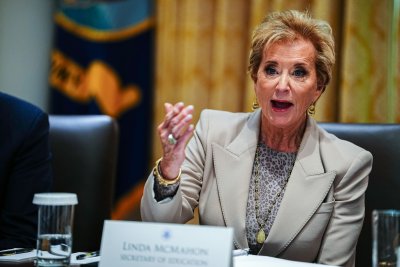Soundgarden reflect on Rock Hall induction and Chris Cornell’s legacy
Soundgarden, the seminal Seattle grunge rock group, were inducted into the Rock and Roll Hall of Fame at a star-studded ceremony at the Peacock Theater on Saturday night. Before they accepted their awards from comedian Jim Carrey and ripped into “Black Hole Sun,” and “Rusty Cage,” the band reflected together backstage on their topsy turvy journey into the ranks of rock’s immortals and the lasting impact of their departed frontman Chris Cornell.
“I like the honor of it and I’m really happy for our fans,” bassist Ben Shepherd said. “I can’t wait to play.”
For guitarist Kim Thayil, there’s a measure of validation in their induction which he recalled from conversations with Cornell. “Chris would say, ‘Remember how you and I, and [bassist] Hiro [Yamamato] would sit around in a room and talk about the bands we really liked…and that influenced us to play together?” It’s like, ‘Well, that’s the kind of band we should be. The band that makes us want to get together and play music.’”

Soundgarden members (from left) Kim Thayil, Matt Cameron, Chris Cornell and Ben Shepherd in 2014.
(Jack Plunkett / Jack Plunkett/invision/ap)
The induction was a long-time coming for Soundgarden. They originally formed in 1984 and steadily moved to the forefront of underground indie rock scene on labels like Sub Pop and SST while touring the country in a red Chevy van. “It was almost like a camping trip with sleeping bags,” Cameron recalled. “I remember I brought this one blue blanket to sleep on.”
“I’d bring my own breakfast. I’d bring a cooler, and I’d put cereal and yogurt in there,” Yamamoto said. “These guys would go to Denny’s every day. I can’t do that!”
After moving to A&M Records, Soundgarden spent the 1990s crafting some of the most innovative, heavy and dynamic albums of their generation. Groundbreaking records like “Badmotorfinger,” “Superunknown” and “Down on the Upside.” Soundgarden disbanded in 1997 but got back together 13 years later in 2010 and resumed working on music and touring.
As rewarding as the Rock Hall honor is, the absence of Cornell –- who took his own life after a concert in Detroit in 2017 – carried a bit of somber note into the festivities. “It’s nice to hear the power of the music that we created, but it’s extremely bittersweet as well that we don’t have [Chris] with us,” drummer Matt Cameron said. “In the few instances where we have performed this music since his passing — it’s only been a few occasions — it’s empowering, but it’s also really, really bittersweet.”
In the meantime, Cornell’s bandmates are continuing to work on a collection of tunes they were recording with him just before his passing. “Once we were able to work on the music again, it all just kind of came back to just how powerful the music still is and how meaningful it still is to us,” Cameron said. “I think we’re going into it with just those types of intentions of trying to make it natural and real, which at this stage of the game, there’s a few things that sound amazing.”
The reunion with Yamamoto – who left Soundgarden around 1989 — for the Rock Hall show went a long way to livening the festivities. As soon as the band kicked into one of their early cuts, “Entering,” during rehearsals in Seattle, Shepherd recalled with a hint of awe that, “It instantly sounded like Soundgarden.”
“That was one of those things where I might have gone to YouTube and had somebody else teach me how to play it again,” Yamamoto said with a laugh. Nevertheless, Shepherd snapped a picture of the moment and gleefully sent it around to friends.
“We weren’t sure how it would work, but Hiro’s so adaptable and he’s such an amazing musician that it sounded great from the get-go,” Cameron said. “A lot of low end, but the band has always had a pretty sizable bass presence in our sound. It was just nice.”

Inductee Kim Thayil of Soundgarden, Taylor Momsen and inductee Matt Cameron of Soundgarden perform onstage during the 2025 Rock & Roll Hall of Fame Induction Ceremony at Peacock Theater on November 08, 2025 in Los Angeles, California.
(Amy Sussman/WireImage)
To bring Cornell’s vocals to life at the Peacock Theater, Soundgarden turned to a pair of younger powerhouses. Brandi Carlile and the Pretty Reckless frontwoman Taylor Momsen. Both are tried and true Soundgarden fans and represent the group’s impact on the next generation of musicians that followed in their wake. It’s something they are particularly proud about.
“It’s still surprising, but it is something that was probably on our wishlist as something we would hope to expect,” Thayil said. “If we’re honest with ourselves and we’re honest with what we’re creating and honest in how we communicate together, then this should happen. But it’s still a surprise and still heartwarming.”
“It is sort of nice to be able to contribute to that continuum of music and have younger generations hopefully be inspired by what we were grooving on with the band, which was you know, self-expression and collaboration and trusting your own instincts and things like that,” Cameron said. “I think is a nice thing to impart on other young musicians.”
As for who they think should follow Soundgarden into the Hall next, Thayil has some thoughts. “Alice in Chains is the first thing that comes to mind, of course,” he said. “I’m surprised to learn that these six people aren’t in the Hall of Fame: Sonic Youth, Motorhead, Iron Maiden, the Pixies, the New York Dolls and the Black Crows.”
“And the Melvins!” Cameron added.



